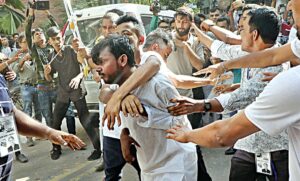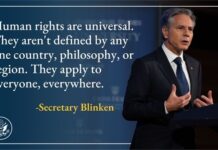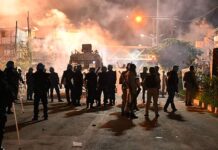
Image credit-The Daily Star
By Adil Khan 22 July 2023
The recently held July 17, 2023, by-election at Dhaka-17 vacant seat that witnessed the vicious attack on one of the opponents, Mr. Hero Alom, an independent candidate revealed two contrasting trends – a missed opportunity for the government and that old habits die hard.
Indeed, the by-election was an opportunity for the ruling Awami League, which has lately been subjected to much criticisms, both at home and abroad, for its history of blatant vote rigging and intimidation of the opposition candidates in elections, the July 17 by-election was a perfect opportunity for the government to prove the critics wrong or at least demonstrate that alternatives are possible. But this was not to be.
Ruling party’s poor history in election management
The ruling party’s track record in holding and delivering free and fair elections, especially since 2014, is so dismal, and by now, where the rigging has become more of a norm than the exception, had alarmed the international community so much that with another General Election looming in early 2024, the US, the European Union, and the UN have made it clear that they would like to see the incoming elections follow “a free, fair and participatory process.”
The US Government has taken their concerns one step further. The US Department of State has introduced a new visa restriction policy which is aimed at supporting a “free and fair” ballot in Bangladesh has warned the Bangladesh government that “we can impose visa restrictions on individuals and their immediate family members if they are responsible for, or complicit in, undermining the democratic election process in Bangladesh.”
The by-election in the vacant seat of Dhaka-17 in Dhaka city was conducted in the backdrop of these concerns and with the expectation that the government would be sensitive and do its utmost and display the July 17 by-election to demonstrate that free and fair election under its watch is possible. This was not to be.
The July 17 by-election and Hero Alom
In the by-election, the ruling party nominated one Mr. Mohammad Ali Arafat, an academic turned politician and an avid and fervent defender of government actions, sometime with upside-down logic, especially government’s wrongdoings.
Contesting the government candidate Mr. Arafat were eleven candidates representing various “friendly” opposition parties and an independent candidate, Mr. Ashraful Alom, popularly known as Hero Alom, “a man behind the curtains of TikTok, famed for his music videos and his whimsical content, came out of the shadows.”
The Bangladesh Nationalist Party (BNP), the main opposition party, stuck to its earlier demand of not participating in elections without a neutral caretaker government and thus did not field any candidate.
While some have considered Hero Alom’s decision to participate in the poll an “entertainment,” others have admired his courage. Yet, there are those who were a bit more philosophical and felt that Hero Alom, who represented no political party but himself and came from a very humble background, may have tried to tell the world that in a true democracy, “… even a man from the grassroots can dare to dream of participating in politics.”
Thus, the July 17 by-election was indeed a perfect occasion to re-invent democracy at its fullest but as events have shown, this was not the case.
Old habits die hard.
Indeed, the poll day turned out to be not a day of celebration of the revival of democracy, rather yet another sad day of doomed democracy in Bangladesh.
On the election day, Hero Alom, the independent candidate who represented no political party but himself, a humble man from the village who matched neither in education nor in stature Mr. Arafat, his rival, the ruling party candidate, contested the election with no intention of pulling the government down nor he could even if he had won, but merely to pursue his democratic ambition never speculated the treatment he received from the ruling party goons.
Mr. Alom was subjected to the most horrific attacks by the ruling party activists that landed him in a hospital, shaken and bruised, with the realization that daring and dreaming of democracy in the current political environment in Bangladesh is a risky business.
The dreadful scenes of Alom being kicked and bashed by the ruling party activists while police looked the other way were painful to watch and a sad reminder of the deplorable state Bangladesh’s political culture has dipped into, lately.
Indeed, if the July 17 by-election had conveyed one clear message, it would be that daring democracy under the current regime is not merely a risky business but life-threatening. Thus, it is no surprise that after getting himself released from the hospital, Mr. Alom announced at a press conference that, “I shall never again take part in any elections under the ruling party.”
Another interesting aspect of the July 17 poll and Bangladesh’s dead democracy was that the voter turnout was around 11%, the lowest ever, which revealed two disturbing and interconnecting trends. Firstly, voters did not bother to take the trouble to travel to the booths to cast votes in an election where they knew their votes would not influence the outcome, and secondly, and this is related to the first, that people have lost trust in all elections in Bangladesh, especially since 2014.
An unconfirmed report also revealed that Mr. Arafat, the government candidate received fewer votes than Mr. Hero Alom in the Cantonment (military garrison), where the voters voted freely without any intimidation and thus had the luxury of exercising their voting rights freely and decisively. Government apparently is not pleased and apparently, has asked for a probe.
Finally, the images, on the one hand of a bruised and brutalized Alom in hospital and the other, the “victorious” Mr. Arafat with flowers, standing beside the Prime Minister at her office have revealed two contrasting political realities of contemporary Bangladesh – a crippled and helpless democracy at one end and celebration of fraud and shamelessness at the other.
In sum, the July 17 by-election has reinforced the long-held belief that elections under the current regime can never be free and fair. The elections under the current regime are mere rituals where they use the façade to impose and re-impose and formalize its choices at the expense of those of the people.
As could be expected, the brazen broad daylight attack on Hero Alom has rattled the international community. They have since expressed their concerns and condemned the attack stressing that “Violence has no place in the democratic process” and that “…Everyone involved in the upcoming elections should ensure that they are free, fair, and peaceful.”
Sadly, instead of reflecting and ordering a probe into the incident and punishing the culprits, the government has chosen to be belligerent.
The recent angry reaction of Bangladesh’s Foreign Minister Dr. A. K. Momen, who bitterly criticized the international community for “interfering in the internal affairs of the country” while haranguing them that more violence and human rights violations occur in their countries than in Bangladesh, they should “mind their own business” is a reminder that old habits die hard.
Prognosis
From the above, it is evident that the expectation that international pressure would force the government to change its ways and encourage it to establish credible institutional means to hold free and fair elections in 2024 looks as elusive a goal as ever. Secondly, knowing fully well that violence against the opponents would damage the government’s credibility, which is already at its lowest did not stop its activists to unleash violence against an opponent which may be an indication that the government may have lost control over its foot soldiers, the musclemen who they employ to thumb down the opposition. The by-election violence may be the Frankenstein syndrome meaning that the musclemen now dictate terms and not the other way round. Thirdly, given that the July 17 violence occurred in the presence of, if not in collusion with, the police/election officials has reinforced the argument of the opposition that not just a neutral care-taker government but without a complete overhaul of the entire electoral governance and the system which is currently heavily politicized, free and fair elections in Bangladesh would be an anathema, an exercise in futility. Finally, and God forbid this happens: if Bangladesh goes through yet another round of rigged elections in 2024, there is no doubt that dissent will rise. A cycle of violence would ensue where a protracted period of civil conflict, bloodletting, chaos, and lawlessness, and eventually, the fracture of the society are a real possibility.
Thus, time for people to unite, fight and restore democracy and decency in Bangladesh sooner than later!
The author is an academic and a former senior policy manager of the United Nations









